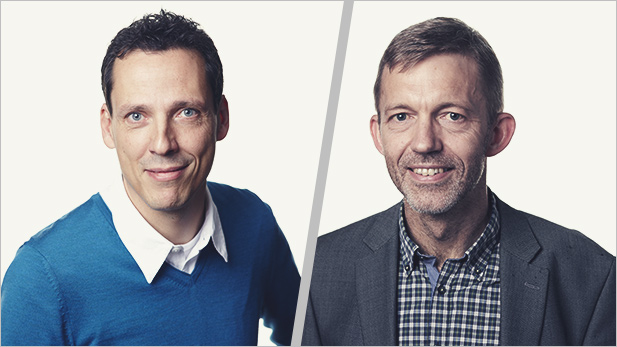Universities strengthen companies

Photo: Bjarke MacCarthy/CBS
Do the skills of employees improve because they have been taught by researchers? What effect does university research have on innovation in private companies? What effect does collaboration with universities have on the growth of companies? These are just some of the questions two wide-scale innovative research projects at CBS will address.
The two principal investigators, Professor Anders Sørensen and Professor H.C. Kongsted, expect empirical data from the research to provide a more solid foundation for the political debate on education and research in Denmark.
"We have a theory that university cutbacks also mean lower quality, in other words, that fewer people get a degree and that graduates are of a poorer quality. There are multiple opinions concerning the effect of cutbacks, but we don’t actually know what the factual consequences are, which is what we expect to quantify with our research," explains Sørensen from the Department of Economics and head of the research project "The socio-economic importance of research-based education".
Collaborate and grow
Jointly with Associate Professor Cedric Schneider, Sørensen submitted a report on the topic to Universities Denmark already in October that shows that companies that work with Danish universities have annual growth that is 2.1 percentage points higher due to more efficient employees.
This project will take the next step to clarify what the implications are for value creation when an employee is a university graduate instead of, for example, a business school graduate.
“Does it make a difference that university graduates come from an environment where the teaching is done by researchers? Do university graduates contribute more to the innovation taking place in companies, or can they be replaced by employees from programmes that are not as research-based,” asks Sørensen.
Photo: Bjarke MacCarthy og CBS
To the left Anders Sørensen and to the right Hans Christian Kongsted
What is effects in biotech?
The other research project, “Investments, incentives and the impact of Danish research”, is headed by Professor H.C. Kongsted from the Department of Innovation and Organizational Economics and will thoroughly investigate good business ideas and the effect academic research has on them.
“We want to understand how universities, companies and researchers interact, how they jointly produce knowledge and innovation and what the socio-economic effects of research are,” states Kongsted. This project takes a closer look at, for instance, the effect of university researchers on the number of patents in the biotech industry, which is a growth leader in the Danish context.
“In this project we’ve chosen to examine measureable factors such as patents, but we also measure academic results on their own terms: How much do researchers produce? What type of publications do they produce and how many citations are there? We also take a broader view of what researchers can contribute, for instance, with consulting or by changing jobs to work in the private sector. The goal is to describe the interactions occurring between companies, universities, and organisations that fund research in order to understand how they affect the individual researcher’s activities,” explains Kongsted, continuing:
“As a society we would like research to be published and put into use. The way things look right now, not all research is useful. Should the aim be, for example, to work more with strategically targeted programmes or to have more basic research? That’s a political discussion on research that we’d like to help qualify. It requires solid knowledge about the socio-economic impact of research based on detailed data concerning the facts.”
The projects have received 10 million Danish kroner each from the Novo Nordisk Foundation and will last four years beginning in 2017.
Watch the film about the research project here (in Danish).
Read more (In Danish): ![]() Læs mere i denne publikation.pdf
Læs mere i denne publikation.pdf